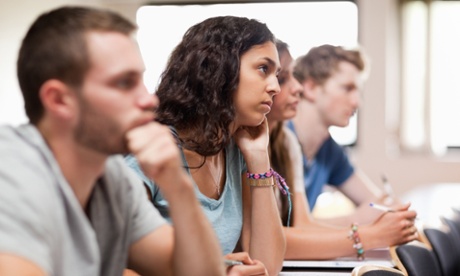
An annual survey of college freshmen has found the lowest levels of self-reported emotional wellbeing in the 30 years, generating concern.
The survey, The American Freshman: National Norms Fall 2014, was conducted among more than 153,000 first-year, full-time college students at 227 four-year colleges and universities. The results are meant to reflect attitudes among roughly 1.6 million students at more than 1,500 universities across the US on a wide variety of public policy, health and political issues.
Just more than half of students entering college in the fall of 2014, 50.7%, reported emotional wellbeing in the “highest 10% of people” or “above average”. That is the lowest rating since 1985, when researchers began asking about emotional health.
Students with disabilities were more likely to report poor emotional wellbeing. For example, 22.4% of freshmen who self-reported being on the autism spectrum with Asperger syndrome said they were “frequently depressed”; 9.3% of students who did not report a disability said the same thing.
Similar results were found in students who reported a physical disability. Students with speech or mobility handicaps, for example, self-reported a “frequently depressed” rate of 16.8%.
Researchers highlighted the issue because students who report stress and depression are more likely to be late, to sleep through or miss class, and to report trouble making friends on campus. Where 13.9% of “frequently depressed” students said they were “frequently” late for class, 5.5% of students who said they were “not at all” depressed said the same.
“With counseling centers on campus reporting a record number of visits and increased wait times, it is clear that campuses have more work to do to assist students experiencing emotional health issues,” the report said, noting that such behaviors were not widespread.
The survey also collects data on other trends, such as aspiration to higher degrees, alcohol use and religion.
Students reported a high rate of aspiring to education beyond college – 28.1% of students said they would like to earn a master’s degree and 43.6% said they would like a doctorate or professional degree.
The survey reported low rates of students who had used alcohol before entering school, about 33.5% in 2014 compared to 74.2% in 1981. But the report also noted that many students’ first experience with alcohol was in college.
Fewer students identified a religious affiliation than ever before. In 1971, students selected “none” as a religion at a rate of 15.4%. In 2014, 27.5% of students made that selection.

